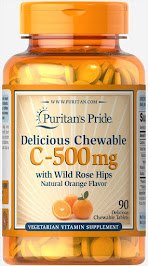Best Chewable Vitamin C Supplements 2021
Vitamin C is an essential nutrient which cannot be produced by humans (Nutrients. 2017). Because your body doesn't produce or store it, you need daily vitamin C for continued health. Vitamin C may be one of the most well-known immune nutrients that protect against immune deficiencies and which supports the prevention and recovery from the common cold and upper-respiratory issues, and also protects your cardiovascular system, eyes, skin, and other parts of your body.
As of December 2020, there are 19 studies that have been launched to investigate the benefits of vitamin C against COVID-19. You can review the status of these trials on clinicaltrials.gov.
Here are the best chewable vitamin C supplements of 2021.

2. NOW Foods’ Chewable C 500

If you’re not a fan of swallowing pills, NOW Foods’ chewable vitamin C tablets may be the product for you.
NOW Foods is a reputable brand that produces a variety of affordable, high quality nutritional supplements. Each orange-flavored tablet provides a 500-mg dose of vitamin C and contains just 1 gram of added sugar. They’re also 100% vegan and free of major allergens.NOW Foods prides themselves on their meticulous testing protocols. Each supplement is tested in-house for purity and potency, and all of their manufacturing facilities are certified by the Food and Drug Administration (FDA).

How Do I Choose Vitamin C?
Selecting the right vitamin C supplement depends on a variety of factors, including the form, quality, dose, and price. There are many forms of vitamin C available (ascorbic acid, sodium ascorbate, calcium ascorbate, liposomal vitamin C etc.) but there is not much evidence that one form is much better than another.
You can also start by considering how you’ll be using the supplement. For instance, if you prefer to take a pill, you’ll want to check out encapsulated vitamin C supplements.
If you don’t like swallowing pills or want to mix it into beverages, your best bet is to consider liquid or powdered supplements.
Next, you want to check the supplement’s quality. Evaluate whether a brand is reputable by exploring their ingredient sourcing and manufacturing standards. A good product will also be tested by third-party organizations, such as USP, Consumer Labs, or NSF International.
Take a look at added ingredients, too. If you’re trying to limit your intake of added sugars, you want to opt for a supplement that doesn’t contain sugar.
Another factor to consider is the dosage. The recommended daily amount of vitamin C for adults is 90 mg for men, 75 mg for women, and up to 120 mg for women who are pregnant or breastfeeding. However, certain medical conditions may require that you take much higher doses (NIH).
Children have lower vitamin C requirements, which range from 25–75mg per day, depending on their age. However, it’s not generally advised to give children a vitamin C supplement unless their pediatrician has recommended it.Note that the Tolerable Upper Intake Level (UL) for vitamin C for men, as well as women ages 19 and above, is 2,000 mg. Meanwhile, the UL for children ranges from 400–1,800 mg, depending on age. Daily intakes at or below these amounts are unlikely to result in any adverse health effects (NIH).
Vitamin C supplements come in a wide range of dosage options. If you’re looking for a high dose, it may be more economical and convenient to find a concentrated supplement. This way you won’t be stuck consuming multiple servings of a lower dose option.Generally, high doses of vitamin C are unnecessary and could contribute to harmful side effects. Only consume high doses if your healthcare provider recommends doing so.
Finally, you want to consider your budget. Some professional-grade brands can be expensive, but keep in mind that a higher price doesn’t necessarily mean a better product. There are plenty of high quality options available at various price points.
Can Vitamin C prevent Coronavirus?
In December 16, 2020, Rob Verkerk, Ph.D., founder and scientific director of the Alliance for Natural Health, announced the launch of an international vitamin C campaign in response to the Nutrients review, which "puts all the arguments and science in one, neat place."
Vitamin C may help shorten the duration and severity of colds caused by other viruses, but this is no guarantee that it will have the same effect on the coronavirus that causes COVID-19.
Additionally, vitamin C is a water-soluble vitamin. It dissolves in water, meaning that excess amounts aren’t stored in your body but instead eliminated through your urine. Taking more vitamin C does not mean that your body is absorbing more (nih).
High dose vitamin C supplements may even cause diarrhea, as they can signal your body to pull water out of the cells and into your digestive tract (NIH).
Moreover, although high dose vitamin C appears promising for COVID-19 treatment, these doses were exceptionally high and given via IV — not taken orally. Additionally, it was only given in cases severe enough to require hospitalization.
Possible side effects
Although vitamin C is a natural compound, getting too much of it can cause uncomfortable and potentially serious side effects.Some of the most common reported side effects include headaches, flushed skin, nausea, and vomiting (NIH). Consuming high doses of vitamin C for prolonged periods may also increase your risk of kidney stones (NIH).
Conclusion
That said, many vitamin C supplements in the market are above the US RDA. It’s important to seek a doctor’s advice if you intend to take high dose vitamin C on a long term basis. To be on the safe side, you may also request for your kidney functions to be monitored.
This article was adapted from Healthline: https://www.healthline.com/nutrition/best-vitamin-c-supplement
.png)
.png)
.jpg)
.png)






Comments